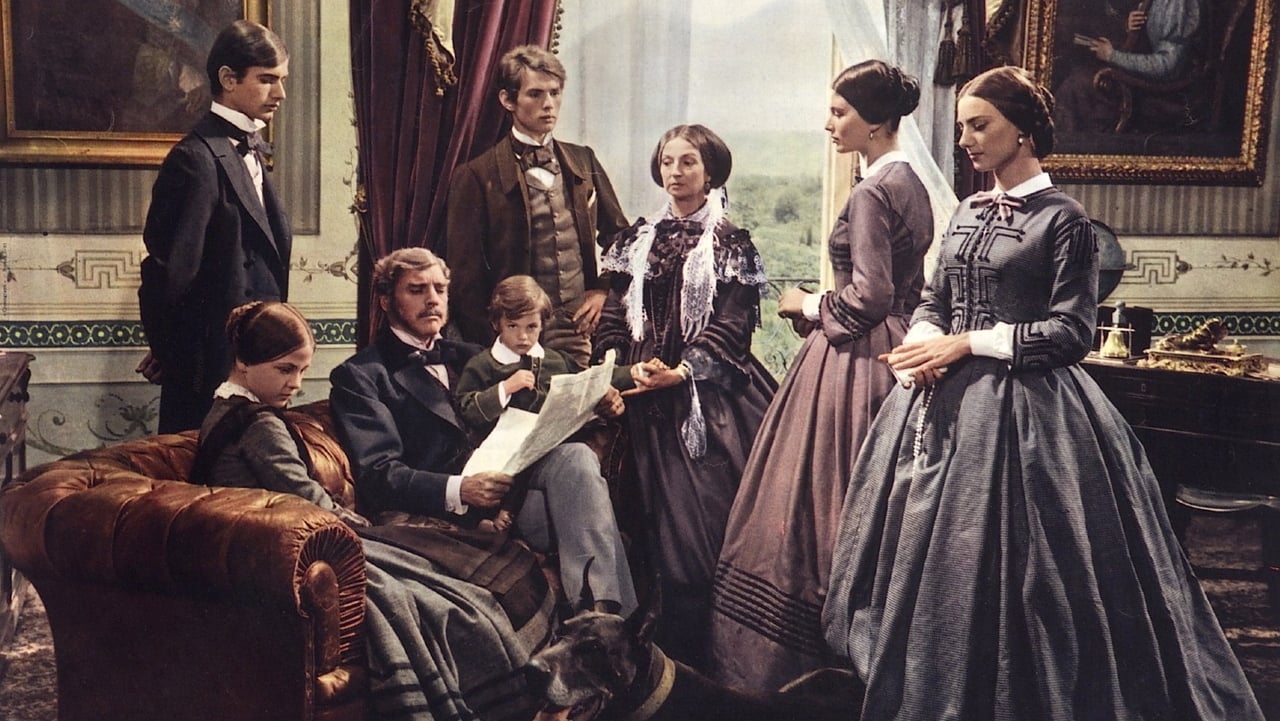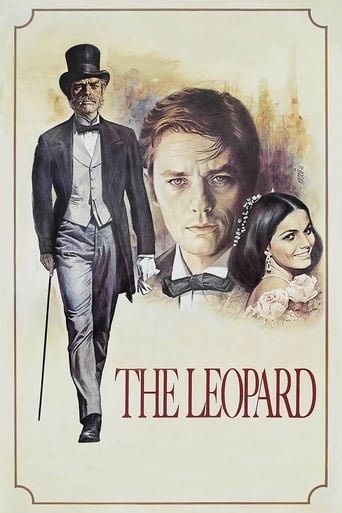SpuffyWeb
Sadly Over-hyped
Afouotos
Although it has its amusing moments, in eneral the plot does not convince.
SparkMore
n my opinion it was a great movie with some interesting elements, even though having some plot holes and the ending probably was just too messy and crammed together, but still fun to watch and not your casual movie that is similar to all other ones.
Ezmae Chang
This is a small, humorous movie in some ways, but it has a huge heart. What a nice experience.
sekander
Right up there with Barry Lyndon. I wonder if Kubrick saw this movie, which predates Barry Lyndon by a good 12 years. It is sumptuous and luxurious to look at but there is enough plot and dialogue to digest, as well. Ever class conscious, Visconti here decides to show us how the other half lives, even if it takes place 150 years ago. Interesting for history buffs like myself to get an insider's view of the Italian war of independence and how the lines between Royalists and Garibaldi's men were sometimes blurred. Oh, did I mention how regal Burt Lancaster looks here. He plays the part to perfection. The young Claudia Cardinale looks great, too, opposite the magnetic Alain Delon. They only add to the sybaritic nature of the film.
Cox Deborah
A great subtle performance by all the main actors. This is where the heart of the novel comes through. Not through the director, but the actors. They have all picked up on the heart of the novel which is only revealed at its very end when Concetta is shown to be the hidden heroine. At the end of the novel we see Concetta in her old age, Tancredi's true love. How could the director have missed this? Perhaps he didn't want to see it as it doesn't fit into the neat 3 act Hollywood movie mold.Burt Lancaster is brilliant. But again here we have an actor giving so much more meaning to the movie than the plot is able to sustain. The ending of the novel is a shock and, of course, a disappointment but it exposes such a poignant moving and truthful loss that it really cannot be omitted.
preppy-3
Italian film that takes place in 1860. A revolution is sweeping over Sicily to overthrow the government. Burt Lancaster plays a prince who realizes a change is coming and his way of life is over. It also deals with his nephew Tancredi (Alain Delon) joining the revolution and his romancing of Angelica (Claudine Cardinale).VERY long but fascinating. It came to America in 1963 and was cut by 30 minutes--it's 3 hours and 15 minutes. Also it was shown in washed out color prints. It was fully restored in 1983 and that's the version I saw. It looks incredible. The film is in rich color with absolutely breath-taking settings. I have never seen such beautiful color cinematography! There's also a great music score by Nino Rota which perfectly matches the images. The story is long and drags at times (a sequence between Tancredi and Angelica in a deserted mansion should have been cut) but I was never really bored. There was ALWAYS something to look at. The acting varies. Delon was a little too lightweight for this role but Cardinale was good. Best of all was Lancaster. He's dubbed but is magnificent. His face perfectly shows what his character is going through. This is an Academy Award winning performance. So very long but never dull. Just incredible. A true classic!
dlee2012
Visconti'mos The Leopard, based on the novel of the same name by Giuseppe Tomasi di Lampedusa is an epic that encapsulates the birth of the modern Italy and the transition from the old world of the privileged but moribund aristocracy controlling small duchies to the new era of the democratic nation-state.Burt Lancaster is surprisingly well-cast as the ageing Sicilian prince who realises his era is drawing to a close whilst Alain Delon, playing Tancredi, represents the ambitious, younger generation, fluid to adapt to a changing situation and seeking glory for their own benefit.The film does not take sides between the aristocrats and the peasants. The aristocratic class is shown to be relatively benign by this period, despite their isolation from reality and lives of privilege. As the priest notes, they are simply different, with different priorities and expectations from the rest of the people. Lancaster's prince is a fascinating mixture of honour, integrity and decadence. Having all that he can want except an exciting wife, he constantly seeks affection from other woman to make up for her dourness and extreme prudishness.Visconti's cinematography is nothing short of breathtaking. Virtually every shot in the film looks as though it could come from an oil painting of the era, so perfect is the framing of the shots and so rich and exquisite is the colour.There is an interesting use of abrupt cuts to the soundtrack during the cuts from scene to scene and this reinforces the abrupt changes happening in Sicilian society.The film's pace is slow and there are times that interest lags but there are enough bursts of humour and drama to sustain one in the end. The flaws and humanity of the people who make up this dying class really do shine through. Ultimately, the film is the character study of someone who recognises the time for change has come yet and finds himself representative of the transitional generation between the two epochs.There is violence in the film and some scenes of warfare however, this reinforces the fact that soldiers are brutal opportunists and that there is no real honour in the military. Indeed, the fact that some of the aristocratic women fall for the delusion that a man in uniform is somehow a good man makes an ironic point about how divorced from the brutal reality they are. Indeed, it is frightening that someone prepared to kill can then rise to a position of power in society, a problem that democracies are still to adequately address to this day.The ball scene at the film's end shows how the classes and generations intermingle in the new life.The dialogue is excellent and seems to translate to English well on the subtitled edition this reviewer watched. Particularly insightful is the soliloquy about Sicily being a stagnating society, that only if people escape whilst young can they be revitalised and shaken out of their apathy. As someone who left another island (Tasmania) in a similar state of apathy (albeit with a much younger society and culture than Sicily), this reviewer can relate to the need to escape and revitalise if one is to have a future.The Prince, though, recognising his age, refuses to escape. He is not world-weary though, just resigned to accept his generation will fall, yet still intent on clinging to the old values of honour and integrity.Ultimately, this is a lavish spectacle on a large enough scale to encompass the saga of the birth of a new nation out of a myriad of ancient and tired kingdoms. It is also a character study of a person who fits into neither world and feels it more honourable to stand aside for the young generation to take charge. It also shows that values do not always change for the better and that something of value, however small, may have been lost when the brutal and ruthlessly ambitious younger generation took power.With some of the best cinematography ever, excellent acting and a truly historical sweep, this is one of the greatest of the studio-bound epics. Of course, like the Prince himself, these films would be a dying breed throughout the 1960s as the new generation of the nouvelle vague movement asserted themselves across Western Europe.

